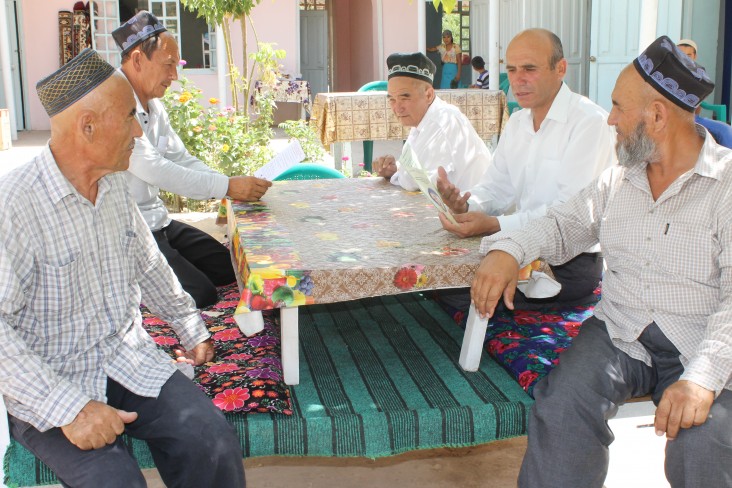
March 2016—Said Taghoybekov is a well-known community leader in the Jilikul district of Tajikistan. “Mothers’ and children’s health depends on us,” he says. “Men should provide their families with healthy foods and support. Tajik village women are dependent on their husbands and, therefore, men’s influence is very important in their lives.”
As a community health educator for USAID’s Maternal and Child Health program, Taghoybekov understands the important role men play in creating healthy families and communities. The project, which is implemented by Mercy Corps in the 12 Feed the Future districts of Khatlon province, builds awareness about nutrition, maternal and child health, hygiene and sanitation.
A reputed advocate in his community, Taghoybekov successfully led previous efforts to construct a health center and greenhouses in his village. Now he has turned his attention to maternal and child health trainings for the men of his community.
Taghoybekov, a 53-year-old father of five whose wife passed away a year ago, cares for his children by himself. He explains how single fatherhood has helped him to understand the role of women and the difficulties they face in their lives. Now he realizes the challenges women face and understands that leaving all of life’s burdens to women is unfair. In addition to sharing knowledge about healthy foods and specific nutritional and medical concerns for mothers and children when he meets with men in his community, he also encourages them to support and appreciate their wives.
“USAID’s Maternal and Child Health project has significantly impacted our communities,” says Taghoybekov. “Our men learn about a mother’s and children’s nutrition, hygiene and also family planning. Women cannot change their behavior if their husbands do not support them. We also learned better and safer food preservation techniques. Now that we know about dangerous germs that can be present in preserved foods, we are more attentive to this.”
According to a recent assessment, in fiscal year 2015, approximately 20 percent of the project’s 722,350 participants were men. However, field staff classified only 413 men as “regular” participants, meaning that they were involved in a project activity at least once per month. These regular participants included male community health educators, village development committee members, and other village leaders.
However, there is a broad consensus among project beneficiaries that increasing male involvement in the project is a worthwhile goal. Women participants have expressed their belief that increased male involvement would benefit the health of both children and women.
Recognizing the role of men as key decisionmakers in Tajik families, USAID’s Maternal and Child Health project is working to provide men with the necessary information and incentives to serve as partners and leaders in improving the health of their families and communities. The project opened in 2008 and will run through September 2016.
LINKS
Follow @USAIDCtrAsia, on Facebook, on Flickr, on YouTube







Comment
Make a general inquiry or suggest an improvement.